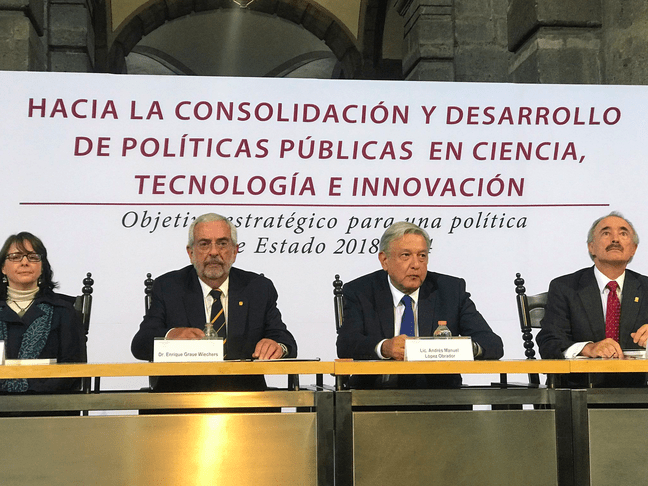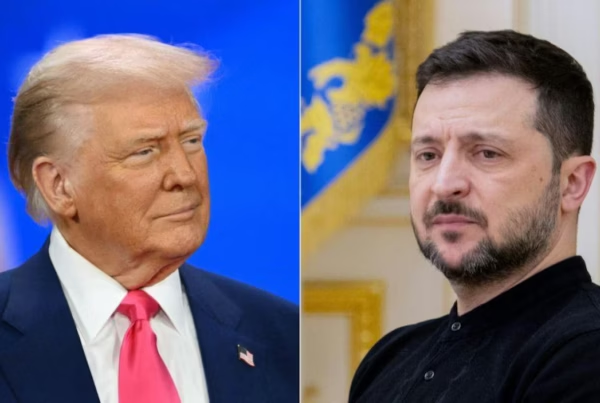Maria Lee
Mexico ranks among the lowest investors in Research and Development among the members of the OECD, with 0.49% of the GDP spent on it in 2016 and an average of 0.42% from 2000 to 2016. Even though there has been a slow increase of the part of GDP spent on the field in the last few decades, this remains well under target for the Mexican government, that – on paper – is supposed to dedicate at least 1% of it to its development, as determined by the 2002 Science and Technology law. The country fares poorly in comparison to others such as South Korea, whose spending in 2016 represented a share ten times larger than that of Mexico.
The academic community is adamant about a greater importance being given to its work, and the change in administration presented a certain hope that change would come. Indeed, the new president, Andrés Manuel López Obrador (AMLO), ran on a promise to cut unnecessary government expenses and reduce corruption, a major problem in Mexico resulting in the misallocation of resources which could be invested in productive projects. After his election, he was presented – as every incoming president is – with a document crafted by the major actors of Research and Development in Mexico, presenting their goals and priorities when it came to where the field should go. He assured that in the worst case scenario, spending would remain the same, but it would not be reduced. However, since the beginning of his presidency, tensions between the administration and the academic community have grown in regards to both funding and autonomy from the federal government.
In terms of funding, there was a considerable reduction to the budget of the National Council for Science and Technology (CONACyT) in 2019, and the proposed budget for 2020 – that is yet to be approved by Congress – simply adjusts for inflation. This is concerning for a number of reasons, one of the main ones being that the Council is the main provider for graduate scholarships in the country. The reduction of its budget deals a blow to students’ opportunities in a country where only 2% of the population holds a graduate degree. This exacerbates the already very present phenomenon of brain drain, which impedes long term development (including that of reliable and durable institutions), as qualified individuals find better prospects abroad. There was almost no pushback against this from CONACyT’s leadership, as the newly appointed director – who lacks any kind of previous administrative experience – put up little to no resistance. The tensions related to the allocation of resources can be illustrated with the example of the Scientific and Technological Consultative Forum, one of the main vehicles the academic community uses to put forth its opinions on government decisions. Earlier this year, CONACyT accused it of misusing its resources, and questioned its obligation to fund any of the forum’s further operations (the current law on Science and Technology establishes the Council’s obligation to allocate resources to the Forum). Faced with an unresponsive executive, the Forum took it to the courts and was granted a decision by which CONACyT was ordered to release the withheld funds.
On top of the tensions related to funding – and arguably more importantly – the government and the academic community also clashed over issues of autonomy. In Mexico, universities are granted autonomy from the federal government, which, in turn, insulates research from unwanted influence. This is something that is particularly important to the academic community, as it has been historically important in its development. During the very beginning of his presidency, in December 2018, AMLO’s administration came under fire for eliminating this provision in his proposed educational reform. After severe backlash, the government came forward to explain that the removal of the concerned clause was a “technical mistake” made during the editing of the document. However, attacks on the legitimacy and credibility of research agencies by the president (such as his labelling of academics as “know it alls” disconnected from the country’s reality) have increased tensions between the two groups, as the government moves forward with more extreme measures.
The reticence from the Mexican government to encourage research and recognize the legitimacy of groups whose findings don’t necessarily align with its interest are concerning in a broader context of disregard for facts by politicians across the world. Actions like these can be seen as a manifestation of the diminishment of freedom of speech guarantees. It is also important to point out that this hostility towards the autonomy of institutions is not limited to the academic community – the president has also repeatedly put into question the legitimacy and the motivation of agencies such as the National Commission for Human Rights, as well as refused to take recommendations by this organ into account, on the grounds of its “hypocrisy.” On top of this, taking into consideration the poor democratic record of Mexican politics – namely the fact that the country saw a twentieth century marked by one-party rule and government repression, particularly that of students and educated communities -, this should be a cause for concern. Coming back to the example of the Forum, the fact that an agency meant to represent the interests of an independent group in government decisions saw its influence reduced by the withholding of funds perfectly illustrates this. After all, as Julia Tagüeña, the general coordinator for the Forum said, “A democracy requires respect for freedom of expression and participation.”
Bibliography:
- Organization for economic co-operation and development (OECD), “Gross domestic spending on R&D”, accessed 07/10/2019. https://data.oecd.org/rd/gross-domestic-spending-on-r-d.htm
- “Importancia de la investigación para México”, Contaduría pública, accessed on 06/10/2019, at http://contaduriapublica.org.mx/2019/06/01/importancia-de-la-investigacion-para-mexico/
- David Marquéz, Fernando, “La importancia de la investigación en México y su lamentable marginación”,La voz de la frontera, accessed on 06/10/2019, at https://www.lavozdelafrontera.com.mx/analisis/la-importancia-de-la-investigacion-en-mexico-y-su-lamentable-marginacion-1936724.html
- “VIDEO: académicos no conocen la realidad del país, se creen todólogos y sabelotodo: AMLO”, La Otra Opinión, accessed on 06/10/2019 at https://www.laotraopinion.com.mx/video-academicos-no-conocen-la-realidad-del-pais-se-creen-todologos-y-sabelotodo-amlo/
- De la Peña, Antonio; Dutrénit, Gabriela; Fernández Zayas, Franco, José; Laclette, Juan Pedro; Camhaji Samra, Alfredo; Morales Escobar, Alfredo. “El Foro Consultivo Científico y Tecnológico: un espacio necesario para el diálogo.”, Nexos, 07/08/2019, accessed on 06/10/2019, at https://educacion.nexos.com.mx/?p=1862
- Morales, Alberto; Zavala, Misael. “AMLO dice que no mantendrá el Foro Consultivo Científico y Tecnológico”, El Universal, 31/07/2019, accessed on 07/10/2019 at https://www.eluniversal.com.mx/nacion/amlo-dice-que-no-mantendra-el-foro-consultivo-cientifico-y-tecnologico
Other posts that may interest you:
- The Trouble with ‘Ecocide’
- Carbon dioxide removal – hit or miss?
- Local Victories for Turkish Opposition — A Sign of Hope?
- Are France and Japan a Mismatch Made in Heaven?
- A Reflection on Dark Tourism
Discover more from The Sundial Press
Subscribe to get the latest posts sent to your email.





